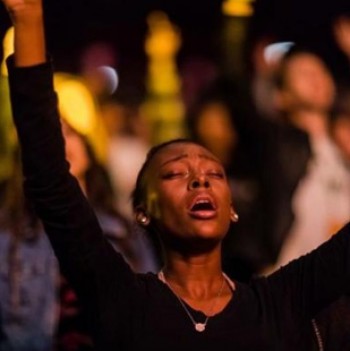Displaying items by tag: Worldwide
China: Church facial recognition cameras
The government wanted to install facial recognition cameras in Pastor Xiang En’s church sanctuary. When he refused they did it anyway and gathered the private data of church members so that they could target them. They will intimidate them with their jobs, their housing, and their children’s education to prevent them from going to church. Pastor Xiang said, ‘Hundreds of policemen raided our church, smashed our building, put the pastors on surveillance, and shut down the church.’ After his church was shut down the first sermon he preached was from Revelation 3:7-8: ‘I have placed before you an open door that no one can shut. I know that you have little strength, yet you have kept my word and have not denied my name.’ Pastor Xiang remains hopeful, despite the opposition his congregation faces. Many prominent mainstream churches and house churches in China continue to be shut down.
Worldwide: inner city churches
A recent Lausanne Movement asked, ‘What can we do to accelerate the impact of Christianity in our cities?’ For the first time in history, there are more people in cities than in the countryside. 1.5 million people move into cities weekly. The church is not moving into cities as fast as the world. For the gospel to transform and flourish in cities, we need global alliances not just of Church leaders, but Christian leaders in the marketplace. Recently a UK news article reported the CofE planting churches in urban areas in a bid to renew itself. The article went on to tell the story of a young man who used drugs and alcohol. His chaotic lifestyle led to prison. Today he is sober, well dressed, studying business management and attending church on Tuesday evenings after he gave his life to the Lord. See also
Worldwide: life getting harder for Christians
Open Doors CEO Henrietta Blyth has written, ‘Around the world, life is getting harder, not easier, for Christians. In India we see rising levels of violence against believers – especially pastors’ wives and daughters. The Chinese government has been clamping down hard too. In North Korea there is still a total lack of freedom for Christians, and yet the world and the church remain largely ignorant of the scale and severity of persecution. Galatians 5:1 says that it is for freedom that Christ has set us free. The God we worship gives us the freedom to choose and we should defend this freedom vigorously, wherever and whenever we can. The World Watch List is vital because it shows where those freedoms are being denied and the ferocity of the battle we are in. For millions of men and women, each year, the choice to follow Him is a matter of life and death.’
Worldwide: abortion largest cause of death
Over 42 million abortions took place globally in 2019, according to the tracking service Worldometers. Once again abortion was the single largest cause of death across the planet, causing significantly more than half the total of all deaths worldwide. More than 190,000 worldwide abortions were recorded in the first two days of 2020. The true totals may be either lower or higher, however, as they rely on health and mortality statistics from the World Health Organisation (WHO), which in turn uses estimates from the pro-abortion Guttmacher Institute. Worldometers found similar numbers last year, leading left-wing outlets such as Snopes to attempt to minimise the news, not by disputing the numbers but by arguing that abortion should not be considered a ‘cause of death.’ Scientifically speaking, however, it is a settled biological fact that the embryos and foetuses destroyed by abortion are living human beings.
Editorial: GO 2020 - Invitation to the Worldwide Prayer Movement and Church
‘Calling the whole Body of Christ to prayer and action for a lost world ‘
Christians around the world soon will celebrate once again the awesome light of Christ that has penetrated and continues to shine in the darkness of human history. At the same time, hundreds of millions of people still have yet to see that light and receive the abundant and eternal life it makes possible. They are without hope and without God, living lives of desperation and meaninglessness.
After being arrested by His light and filled with His Spirit, the early church turned the world upside down. Following Jesus’ command, as a first step they stayed in Jerusalem and “joined constantly together in prayer”.
That culture of united prayer brought the empowering of the Holy Spirit and ignited remarkable spiritual breakthroughs as the Gospel began to spread throughout the then known world. This same pattern of prayer preceding evangelism has been a consistent pattern in all the great revivals and mission advances from then on through church history.
Now, tens of thousands of churches with hundreds of mission organizations and prayer movements are joining forces for an epic prayer and mission initiative unlike anything the world has known. It is called Go 2020. The goal is to reach one billion who are still unreached by Christ’s Good News. Together, by May 2020, we aim to mobilize 100 million Christians to pray for those in their communities that do not know the Lord as well as those across the seas that are part of unreached people groups.
No one organization or movement can accomplish such a staggering feat, but if we flow together like tributaries in one unstoppable river, this can be achieved! Getting God’s heart of love for the lost through prayer will lead to our sharing Jesus with them in the power and sensitivity of the Holy Spirit just as the early church experienced.
Would you and your church or ministry organization consider joining with millions of other Christ followers in such an awesome undertaking for His glory and so that everyone may encounter His great light?
Together, as we pray, mobilize, and trust the One who has all power, we can see the following happen by the end of May next year:
One billion people being reached with the Gospel and millions upon millions getting saved all over the world through May 2020.
Unreached people groups hearing the Gospel for the first time and planting new churches among them.
100 million Christians inspired and empowered by the Holy Spirit to pray and share the Gospel with as many as possible in their own communities and to the ends of the earth.
50 million new believers integrated into existing and new churches.
Personal Prayer: Lord here I am, use me! I will pray for and share the Gospel with others who need to hear it. https://www.go2020.world/get-involved

GO2020 video: https://vimeo.com/342384375
This brochure can also be used to give others the vision of Go 2020 (some translations are also available).
Further information and helpful resources can be found at www.go2020.world/prayer. Please have a look at these resources and share them with others in your unique network of relationships.
Imagine how God could use you, your friends, and colleagues to ignite a movement for Jesus in your city and beyond!
All through 2020, a series of 40-day prayer guides will help us pray daily for those still unreached and for the harvest to be brought in. Here is the link to that guide which we hope you will share with those in your network or organization.
Please let us know if you are willing to help with this mobilization process.
The fulfillment of Christ’s Great Commission is closer than we realize if we can join our prayers and efforts together to make Him known through Go 2020.
Click on this link to get helpful resources and information updates.
Yours in Christ,
Jason Hubbard - Executive Coordinator
John D Robb – Chairma
International Prayer Council and International Prayer Connect
School of Prayer for the Nations
This past March a group of 15 people gathered to pray together for seven days on the outskirts of London, England. Nothing remarkable about such small beginnings, and still too early to know if it will ever become more than that. But this disparate group assembled as a faith-filled response to a conviction and dream given by God, and most of us have stories of such small beginnings growing into something much more.
From South Korea, Brunei, Nigeria, the Netherlands, Canada, the USA, and England we gathered. Missionaries, worship leaders, researchers, educators, medical professionals, students, taxi drivers. Anglicans, Pentecostals, Baptists, Presbyterians, post-evangelicals, charismatics. Boomers, Gen X, and Millennials. So much diversity in such a small group! But this was a core part of the vision – a vision best described by first sharing a few points about the spiritual challenges and opportunities of our times. Initially, they might seem unrelated, but their profound connections should become clear soon enough.
Christianity is a Global South religion. The Global South has eclipsed the Global North in both church growth and in sending missionaries. The worldwide reality is that our faith is increasingly an African, Asian, and Latin American majority faith. This is not news. In fact, Christianity has been a majority Global South population since around 1980. Think of it this way: the global median age is around 30 years old. This means that most people alive in the world today were born since the tipping point when Christianity ceased to be a Western majority religion.
The Global South Church is a praying church. Churches – and Christians – in Africa, Asia, and Latin America tend to be more engaged in and comfortable with prayer. This is in part due to the acceptance of the reality of the spiritual world and the supernatural, in contrast to the highly materialist and secular nature of Western societies. It is no accident that the most dynamic prayer movements of our day are happening in places where it is normal to expect God to actually answer prayer, and where the reality of spiritual evil is acknowledged and addressed.
The missionary task remaining faces increasing and intensifying opposition. There are many sensible sociological and cultural aspects that inform and explain this dynamic, but as Christians, we must acknowledge the spiritual warfare that is inevitable when the Gospel presses into the heartlands of other religious systems. The more progress we make in global mission, the greater the spiritual opposition is going to be. “The devil has come down to you in great wrath, for he knows his time is short!” (Rev 12:12, ESV). The persecution of Christians around the world is intensifying, with the horrific Easter attacks in Sri Lanka as just one recent example.
Prayer is being once again being understood as an effective tool for mission.It may be impossible to get missionary visas to many countries. It may be equally impossible for most believers to be able to travel to the most spiritually needy places on earth, even for short-term trips. Prayer, however, needs no passport or visa! We can throw vast amounts of money and human resources at an unreached part of the world, and apply all our cultural anthropology and linguisticsand missiology and see no fruit. But in recent years, the increase of targeted and sustained intercession is seeing an increase in breakthrough. It is no coincidence that global prayer initiatives such as 30 Days of Prayer for the Muslim World (www.30daysprayer.com) have coincided with the greatest response to Jesus among Muslims in history.
A globalized Christianitycan maximizethe beauty of unity in diversity. God places redemptive gifts into every culture, and we have much to learn from one another. What God has instilled in Nigerians, Indonesians, Brazilians, Samoans, and Finns are aspects that my own culture cannot present to Him. No one denomination, culture, or tradition can ever display on its own the glory of God the same way that we can when we demonstrate that we are one in Christ.But the threat of division among God’s people remains, and nothing delights the enemy more. We may not be murdering each other as happened centuries past in “Christian” Europe, but bitter acrimony between different denominations, doctrines, and networks seems everpresent.
Ancient wisdom is revitalizing the Church in these shallow times.The contemplative intimacy of the Christian mystics, the missional spirituality of the Celtic peregrini, the holistic outworking of faith in Benedictine communities, the singing of the Psalms in many Reformed traditions, are providing deep wells of living water for the increasing number of believers disillusioned with the shallowness of what they experience in contemporary worship.
The relationship between generations is under threat. The intensity of resentment, bitterness, and misunderstanding between boomers, Gen X, and millennials is a playground of the enemy and grieves the heart of God. It is God who promises to send one who will “turn the hearts of the fathers to the children and the hearts of the children to the fathers” (Mal 4:6, ESV). Those of us in global prayer ministry have seen the brokenness that comes from the rift between generations, and the beauty and power of reconciliation and unity.If there is anywhere such breakthrough can occur, would it not be the body of Christ?
Traditional missionary recruiting methods are in rapid decline in the West, and have never been widely successful in the Global South. Telling a younger generation that they must go and proselytize the world brings diminishing returns, no matter how many shiny pamphlets are distributed or how many water bottles are given out at mission conferences. What is working,it seems, is drawing them together to passionately worship and pray. When this worship turns into intercession, especially intercession for the nations, then we see the Holy Spirit calling forth people to serve Him in the fields of the world.
We are seeing a restoration of the power of community. Rationalism, enlightenment philosophy, modernity, and the global dominance of the West all put the individual atop the pedestal of human identity. Thankfully, the pendulum has swung the other way toward a healthier balance between community and individual. Intercession for the nations is not a solo performance! The mushrooming of houses of prayer around the world in the last 20 years bears this out. Intercession is best done in community. As the African proverb states, “If you want to go fast, go alone. But if you want to go far, go together.”
God is bringing a convergence of the streams. Prayer movements are connecting (hence the existence of International Prayer Connect!). Mission organisations and evangelistic ministries are collaborating. Research initiatives are working together and sharing information. All of these are happening at unprecedented levels. And now, these streams are overlapping, intermingling, and deliberately helping each other in the greater vision of the Great Commission – seeing vibrant communities of people from every tongue, tribe, and nation worshipping and following Jesus!
Serving with Operation World, it is part of our remit to study, report on, and mobilize intercession for all of the above. But for a few years now, God has been stirring us to pray and think about taking it to another level. And so the question on our hearts has been as follows:
What would it look like if a community was formed to be set apart specifically to intercede for the fulfillment of the Great Commission? A community where the prayer, mission, and research movements converged. A community that was deliberately diverse – intentionally multicultural, intergenerational, trans-denominational and trans-organisational. A community that drew from the richest traditions of 20 centuries of church history and the countless ways in which God is at work today. A community of people that gather from the nations, in order to pray for the nations. A community that could learn from one another as they walked out a lifestyle of intercession together – Africans, Asians, Latin Americans, Europeans, Middles Easterners, and all the rest, bringing the redemptive gifts God has placed in each of our cultures, coming from many different denominations and church traditions and all the richness therein. A community whose greatest desire is to see the Lamb upon the throne being worshipped by every tribe and tongue and nation!
What would such a community look like? What would it be like to be part of such a vision?
For seven days in March, 15 of us got to explore these questions. And it was glorious. On a leafy campus of All Nations (www.allnations.ac.uk), a college which exists to train missionaries, in partnership with Operation World (www.operationworld.org), a research ministry which exists to mobilize prayer, on the outskirts of one of the world’s most multicultural cities with its own great spiritual legacy and its own great spiritual needs, we got a glimpse of what God could do with such as vision.
The vision is so compelling, and our experience so positive, that we are not just repeating this gathering, but building it out to fill four weeks rather than just seven days. It will run from 9 June to 6 July this year. Despite this being a big step of faith, and on short notice, we are full of expectation to see what God will do! He is in the business of exceeding our expectations. He is in the business of answering prayer. He is in the business of fulfilling His purposes. And He is in the business of bringing glory to Himself!
If you are interested in being a part of this “School of Prayer for the Nations”, please write to This email address is being protected from spambots. You need JavaScript enabled to view it. or visitwww.allnations.ac.uk/courses/short-courses/school-prayer-nations
Jason Mandryk – IPC Leadership Team
Operation World
619 new Bible translation projects in 2019
Wycliffe Associates is advancing Bible translation and has received requests to launch 619 translation projects worldwide, including groups in DRC, Indonesia, Papua New Guinea, and Nigeria. ‘When they hear that the entire New Testament can now be translated in just months through ground-breaking technology, they are astonished, and they plead for a chance,’ said Wycliffe’s CEO. Traditionally, translations of the New Testament into another language have taken as long as 25 to 30 years. Pray for God's protection over Bible translation workshops for mother-tongue speakers, and for adequate funding for technology resources. Pray for God to keep translators safe when working discreetly in places where Christians face intense persecution. To date, the organisation has installed 90 print-on-demand units in 31 countries. By God’s grace they have distributed 5,485 tablets in 67 countries so far.
Gender-based violence against Christians
Afghanistan, Libya, North Korea, Pakistan, and Somalia are the five worst places for women to live, according to the 2019 World Watch List of ‘50 most difficult places to be a Christian’. The list reports that, in contexts which restrict women’s legal rights to equal representation, minority Christian communities are especially vulnerable to having their women and girls sexually attacked, forcibly married, subjected to domestic abuse, stripped of their inheritance, or even killed - all with impunity. Sexual violence is used as a means of power and control against Christian women. Discrimination based on stereotypical roles of men and women is one of the most widespread human rights violations worldwide. It can assume cruel forms and deprives many women and girls of their rights to life, freedom, and respect for human dignity. In Afghanistan, ‘women found to be married to new converts from Islam and sharing their husbands’ Christian faith, are punished by being raped. The same happens with children of converts who are at risk of child abuse.’
Widespread persecution of journalists
The risks journalists take when reporting on corruption continue. Ahmed Hussein-Suale, an undercover journalist working on an investigation with the BBC about corruption in Ghana’s football leagues, was shot and killed after a politician called for retribution against him. In Turkey, journalist Pelin Ünker was found guilty of ‘defamation and insult’ and sentenced to thirteen months in jail for her work on the Paradise Papers investigation into offshore tax havens. Turkey has the world’s worst record for jailing journalists - 68 in prison at the end of 2018, all of them facing charges of crimes against the state. Journalists play a vital role in exposing the corrupt and their methods; but they face threats, violence, arrest, and death as a result. Since 2017, over 190 journalists have been incarcerated worldwide for reporting on corruption. See also
Global inequality is being ignored
An Oxfam report, released to coincide with the International Economic Forum at Davos, reveals that the world’s 26 richest people own as much as half the planet’s population. Addressing such large disparities may require coordinated action at the global level - for example a wealth tax. The widening gap is hindering the fight against poverty. A 12% increase in the wealth of the very richest contrasts with a fall of 11% in the wealth of the poorest half of the world’s population. In the ten years since the financial crisis, the number of billionaires has nearly doubled. The report said that a wealth tax on the 1% wealthiest would raise enough to educate every child not in school and provide healthcare that would prevent three million deaths. Ten thousand people are dying for lack of healthcare every day. But despite the profound impact of these statistics, there is little sense of urgency to act on any of the issues.









